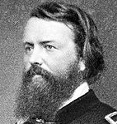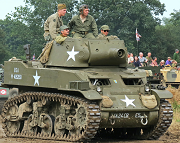|
Thanks for the responses, guys - it's interesting to see how far off Grant was in his estimation of how the Confederates worked. I guess everybody has a little McClellan in them somewhere.Nebakenezzer posted:I started watching the Ken Burns Civil War documentary on Netflix. poo poo is legit - hopefully I actually develop a base for appreciating Sherman and Grant, aside from knowing they were people reckoned as failures until war came along. Grant's endearingly self-deprecating about this throughout his memoirs - he describes a lot of his early life in particular as "And then I tried my hand at doing this, except I hosed up 'cause I'm a dumbass, oh well." He even does it occasionally during the war itself - one funny story that sticks out in my mind was a time when he was talking with Lincoln and argued about wanting to make sure to use Eastern troops to help secure the victory so that it doesn't cause any bad blood later when Western troops could brag about having done all the work and won the war. Lincoln responds by saying "I never thought about that until now, thanks for bringing it up." Later, Grant notes, nothing happened in the way of East-West animosity after the war, "so I guess I was the only person who worried about that, oh well."
|
|
|
|

|
| # ? Jun 6, 2024 16:41 |
|
Someone already mentioned it but it's vital to keep in mind what those terms meant at that time. Those terms are very different for a post ww2 reader.
|
|
|
Nebakenezzer posted:I started watching the Ken Burns Civil War documentary on Netflix. poo poo is legit - hopefully I actually develop a base for appreciating Sherman and Grant, aside from knowing they were people reckoned as failures until war came along. I was going to joke about we need Brian Blessed to do something like that for the Napoleonic Wars but then I remembered he did voice acting for a old school legit documentary about the battle of Austerlitz. So I dunno, uh Stephen Fry or Jeremy Paxman I guess would do. What we need to talk about more in this thread now is Battlefield Medicine. Like the creation of actual ambulances of the grand armee.
|
|
|
|
|
Cyrano4747 posted:Someone already mentioned it but it's vital to keep in mind what those terms meant at that time. Those terms are very different for a post ww2 reader. "From New York on the Atlantic to Chicago on Lake Michigan, an "Iron Curtain" has descended across the continent..."
|
|
|
|
Years after WWII, Americans were considering missiles floating at sea: http://www.armscontrolwonk.com/archive/205397/icbm-basing-modes/
|
|
|
|
JcDent posted:Years after WWII, Americans were considering missiles floating at sea: Wow. Is there anything they didnt think of strapping an ICBM to? I would have said blimp, but there it is. a Goddamn ICBM hanging off a Goodyear blimp.
|
|
|
|
Saint Celestine posted:Wow. Is there anything they didnt think of strapping an ICBM to? I would have said blimp, but there it is. a Goddamn ICBM hanging off a Goodyear blimp. I was gonna say on a train, but nope, its there...
|
|
|
|
Tomn posted:For that matter, how far were the American soldiers motivated by their causes, as far as we can tell? The volunteers would go without saying, but I imagine the draftees were a good deal less enthusiastic. This is a pretty loaded topic and it is one that gets pretty regularly hijacked by political discussion for obvious reasons. That being said, the biggest recruiting draws for both sides was some combination of "adventure" and "money and food", which is pretty consistent with western armies all over the world during the era. As far as selling a larger political cause goes, the CSA had a pretty easy job here: "the drat Yankees are invading your country" was pretty much all that was needed. That kind of recruiting slogan has been universally effective pretty much any time it has been used throughout human history regardless of its validity and the ACW was no different in this regard. The North had a much trickier message, and Lincoln's careful management of the "why we fight" message is to me one of the most brilliant political maneuvers in American history. Initially it was very, very straightforward: "you can't secede you idiots, and we're going to come teach you a lesson". This resonated very well with the early volunteers, as it raised some ire against the south without really touching the tricky issue of slavery and race. As the war went on, the message gradually evolved along with the political leanings of the army, moving more and more towards a message of abolition and populism. This is probably pretty obvious to all, but you can really point to the Gettysburg Address as the kind of turning point in Lincoln's messaging to the army. quote:He also talks a lot about the divided commands of the North, contrasting this with the South's more unified command structure and interior lines which allowed the South to shift troops around and concentrate forces on weaker Union forces while the Union generals were squabbling about who had the right to order who around. He seemed to think that the most important part of his being assigned to command the Union armies was just the fact that there was now one general in charge of everyone who could now devise a coherent strategy that didn't allow the Confederates to just divide and conquer at will. Question - did the Confederacy actually have a more unified command structure, or did it just seem that way to him at the time? I think there are two answers to this question. First, as it relates to a national unified command, as has been noted the South had nothing of the sort. Cooperation between theaters was limited to dispatches that politely requested you please perhaps help out your adjacent theater if practicable, signed your respectful servant general so and so. The one big exception to this was moving Longstreet's corps west to go wreck poo poo at Chickamagua, which was obviously a very successful example of the use of interior lines and whatnot. Now, to speculate a bit more about what Grant might have meant here: the Southern armies had much, much less interference from their civilian governments than did the North. Grant spent a good chunk of the war dealing with very obnoxious orders, suggestions, and various other intrusions from Lincoln, Halleck and even Congress, which was something that no Southern commander ever had to deal with. I'd go so far as to say Lincoln's tendency to meddle was his biggest weakness as a leader, and one that he didn't really grow out of until Grant finally took over as Supreme Warlord almost 3 years after the war started. Essentially, aside from the appointment/dismissal of army commanders, establishment of basic strategic objectives, and the occasional mediation of conflicts between general officers (usually due to Braxton Bragg) Davis really had little hand in the operational or tactical employment of the CSA's armies, which was both deliberate and difficult for him but was probably the best way to have gone about things.
|
|
|
|
Animal posted:I was gonna say on a train, but nope, its there... They even have a ICBM mounted on a hovercraft, a VTOL, and a barge.
|
|
|
|
Saint Celestine posted:Wow. Is there anything they didnt think of strapping an ICBM to? The moon (or at least that's what they want us to think)
|
|
|
|
steinrokkan posted:The moon (or at least that's what they want us to think) There was in the 1950's a proposal to nuke the moon. The idea was that the Russians would be able to see the explosion via telescope and be appropriately scared for two reasons- A: America has the technological ability required to nuke the moon B: America has the batshit insanity required nuke the moon
|
|
|
Saint Celestine posted:They even have a ICBM mounted on a hovercraft, a VTOL, and a barge. Oh my!
|
|
|
|
|
P-Mack posted:There was in the 1950's a proposal to nuke the moon. The idea was that the Russians would be able to see the explosion via telescope and be appropriately scared for two reasons-
|
|
|
|
I'm glad you appreciate the link. There's some benefit to thread archeology! 25741 post in the Cold War thread, 25741 pooost...
|
|
|
|
This is basically my favourite page. Positive features: None.
|
|
|
|
I like the "minimal environmental impact" and "Violates SALT II treaty"
|
|
|
|
WW2 Data In our continued look at Imperial Japanese Navy explosives, we come across a few more bombs before transitioning into flares. Which bombs used an electric fuze, and how was it similar to Schrage Musik? Why did the IJN use glass as a filling for one of their practice bombs? What is the purpose of the lead cap in the various flares they used? Find out at the blog!
|
|
|
|
Jobbo_Fett posted:Pop Quiz: At least one type of Imperial Japanese Navy practice bomb had a filling that consisted of glass disks, as well as titanium tetrachloride. The bomb in question was used against target ship(s) Why'd they use the TiCl4? Just for the smoke to verify impact?
|
|
|
|
Phanatic posted:Why'd they use the TiCl4? Just for the smoke to verify impact? That would be the most obvious reason. A dummy bomb would have no explosives, so a big puff of white smoke would tell you where it hit.
|
|
|
|
Is there any good historical fiction about the 30 years war? Something like the Sharpe or Aubrey-Maturin series, except about a landsknecht? Between lurking this thread, and getting back into EU4, I've had an itch for some reason
|
|
|
|
P-Mack posted:There was in the 1950's a proposal to nuke the moon. The idea was that the Russians would be able to see the explosion via telescope and be appropriately scared for two reasons- They obviously did it to destroy the secret nazi moon base!
|
|
|
|
The whole document is pretty much The details of the airships basing scheme are just hilarious. quote:The continuous air alert carrier is 1000 feet long and displaces 14 million cubic feet, and is capable of 30 knot operations for up to 3 weeks. Three missiles (total payload 300,000 pounds) with multiple warhead are carried, and are launched via parachute drop or launch tubes. 167 Dirigibles are required (assuming a 60% readiness rate.) Just for context, Hindenburg was 800 ft long and displaced 7 million cubic feet, so 20% longer and twice the displacement. So it's the largest airship in history, and there have probably been less than 167 rigid airships built in history in total.
|
|
|
|
edit: Now with links! A Goon Objects: Meet our Hero George Goes to War What Baker did next Private George Baker George and the Frenchmen Baker in Prison Wherein George Baker sees some Women (WOMEN!) It’s Christmas 1917 and all our boy George wants is an orange. “A big orange, an orange that should glow as the sun through mist. An orange I could set upon my window ledge upon the cell side of the fourteen small oblongs of thick glass, and that I could gaze upon while the sun-rays made it glow” Sadly, he gets “cocoa and porridge and bread and axle-grease margarine”. Christmas is no time to be in prison, and passes just as any other day - and December turns into January and February: “the dreariest months of my life. My nights were nights of broken sleep and my days days of weariness of body and torpidity of mind. My thoughts were sluggish and my moods depressed. I read little and wrote nothing. I made brushes mechanically and mechanically sewed mail bags. It seemed to me inconceivable that there had been a time when I should be in prison no longer” Prison is not only long, dull and depressing, it’s also destined to repeat. George, while faithfully looking forward to his release in March, knows that he’ll end up again in the hands of the army, and then: “the fortnight’s guardroom interlude, which would precede the beginning of my second sentence, in my second prison after my second court martial.” On the same day as the Germans launch the Spring Offensive, George is released from prison. Waiting for him are “two unknown friends, sisters and Quakeresses”, who’ve come to greet him after getting his release date, probably from the No-Conscription Fellowship central offices which kept tabs on Absolutists in prison. The outside world is bewildering and strange - though George focuses on one thing only (“men and women were talking freely - men and WOMEN.”), he’s forgotten his social graces after a year of eating and living alone, blaming prison for his inability to clumsily flirt with them - “I would have liked to thank them for the fact that they were women, with little feminine gestures and graces and courtesies”. On the train from Waterloo, he’s actually sat opposite - gasp - two girls of eighteen or so, and momentarily forgets that he is “in the world beyond the wall”, and flanked either side by an armed guard. His train is to barracks - the whole cycle is about to begin again. Before it does, though, George manages to etch the girl into his memory: “The girl in the corner seat had bobbed brown hair, an unbuttoned half length brown tweed coat, a short frock whose apple green material the unbuttoned coat half revealed and half concealed, a white linen collar against which a v-shaped section of the girl’s neck showed the bloom and something of the colour of a ripe nectarine, a pair of brown silk stockings, and a pair of brown brogue shoes. To me, traitorously forgetful of the two bad snapshots of the little brown slip of a girl away in Kent which had already been restored to me on release, and at which I had already surreptitiously peeped a dozen times or more: to me this girl in brown and green seemed the daintiest human alive.” Awwwwwwww - a little later, she notices him staring, and he remembers he’s unshaven, with long dirty hair and a haunted look in his eyes and feels very ashamed. She gets off the train, and he’s returned to Salisbury Plain where, one year before, he had resolved to go to prison. Dwelling heavily on the war, on the backs-to-the-wall order, on the sheer scale of the battles in 1917-1918 which he had heard nothing of, George actually swears, apparently for the very first time (as his “austere puritanism of my working class home had until that moment kept me from such foul-mouthedness”), with a resounding curse of “god blast their bloody eyes!”. Sorrow and depression is bolstered a little by anger, and once at Salisbury, a couple of days of unrestricted food, chatting with Non-Combatant Corps men and, (“curses!”) the same Plymouth Brethren COs, who for the past year have been praying not that George is safe, but that he’s found God. He is allowed two days of freedom in the camp. It being 1918, the Army is not only used to Conscientious Objectors but by and large, the soldiers themselves are supportive of anyone who stands up and says “this is all bloody pointless!” - George’s attempts to sow pacifist sedition are tolerated (“What I always says is that there’s a lot to be said on both sides, mate - wish I had your guts”), but the system will soon grind it’s gears and send him back to solitude. On the third day, he’s given an order and refuses. No vacillation this time, and a quick court martial follows - eighteen months hard labour, less than he had thought, to be served in Winchester Prison a more hospitable place than the vast and terrible Scrubs. A few more days in guard rooms will follow as he winds his way slowly from Salisbury Depot to Winchester, meeting and chatting to "normal Tommies, for whom carpet slippers and a crackling fire hold more appeal than a Guardsman's boots", and meeting a fellow prisoner - this one a serving soldier - who tells George all about the women he'd been with before the war, and the ones he'd paid for in France. "Not only the artist [George has been talking about the poetry of the common soldier for a couple of pages] but the man in me began to make response. I was twenty three. I had but one affair of the heart, a boy and girl idyll of shy kisses given and shy kisses received. Sex-hunger fell upon me. Unless the War should end and I should be released, I should see no woman's face for almost eighteen months, and for eighteen months should hear no woman's voice. It was unfair; it was unnatural" For all that soldiers legendarily do nothing but think about sex and wank, there's a surprisingly small amount on the psychological impact of sex deprivation in the First World War, for soldiers or COs - there's this understanding that things either weren't that bad, or that men quickly got used to it, or that dugouts weren't filled with pin-up pictures, or even that British soldiers weren't festooned with French porn bought at literally every railway stations, or worst of all Dan Snow's magnificently idiotic enthusiastic euphemism that brothels behind the lines allowed young British men "much greater sexual freedom than in peacetime Britain". But then, there's even less on COs in prison - those paragons of socialist and pacifist virtue never just want a shag, they have higher things on their minds... "I remembered the little brown slip of a girl in Kent, the girl of the green frock in the train from Waterloo, the militant of the East Blatchington Esplanade, my heroine of Holloway. Remembering them I began to pace my cell, restless with desire awakened and delight unattained. Was I who knew desire never to know delight? (In fact it was less desire I knew than the idea of desire, which beckoned to me like a woman of the streets) Was I to spend my years a man unloved and unfulfilled?" Poor boy. On to Winchester. lenoon fucked around with this message at 20:01 on Apr 11, 2016 |
|
|
|
Jesus christ, he's also a 23 year old virgin who obsesses about sex in the most pussy-on-a-pedistal way possible. This guy really is the ur-goon.
|
|
|
|
In his defence he seems to have been able to identify the problem (himself, being in prison for most of 1917-1919), then immediately rectify both after the war, all without blaming women, becoming a pua or channelling the frustration into "ironic" idiocy, so he ends up getting less goony. This is definitely the gooniest he gets - which is why I made a post about all of two pages in his autobiography.
|
|
|
|
There might be a few more wobbles before we get back onto terms. Or it might be sorted by Wednesday. C'est la guerre. 100 Years Ago, Sort Of It's the 6th of April. The blokes in Mesopotamia are fresh out of miracles. For once I have trouble criticising a general's decision to send a few hundred more men to their deaths in an attack he knows almost certainly won't work, given that at exactly the same time, Edward Mousley's rations are being reduced to the equivalent of three empty sandwiches a day. Better news from Africa, where a rather cowardly civilian administrator has surrendered Lolkisale Mountain in just enough time to stop an entire brigade from dying of thirst. Worse news from the Armenian genocide, where Grigoris Balakian gets told to gently caress off and die in only slightly more words. More submarine excitement in the Black Sea has almost the entire Russian command structure paralysed with fear; Clifford Wells is still in quarantine for measles; Maximilian Mugge gives a very interesting record of the various scams practised by his NCOs to enrich themselves at the expense of the men; and Private Louis Barthas continues his quest to regain the corporal's stripes that he doesn't want to wear. lenoon posted:or that dugouts weren't filled with pin-up pictures, or even that British soldiers weren't festooned with French porn bought at literally every railway stations One of my favourite parts of the Wipers Times is the frequent references to "Munque's Gallery" and "Kirschner's collection". Incidentally, I've just noticed that George Baker appears to have been caught up in the very same measles outbreak that both Mugge and Wells have also encountered at various points. It's a small war after all...
|
|
|
|
So I've been walking past a bookstore some time ago, and hey, there's a new Norman Davies book out... oh no
|
|
|
|
So... uh... I'm just gonna go ahead and look ignorant and ask what the problem here is. All I know about about Norman Davies is that he's one of approximately 7000 historians who've gotten into a slapfight about Poland and the Holocaust the details of which I have no clue about.
|
|
|
|
Trin Tragula posted:There might be a few more wobbles before we get back onto terms. Or it might be sorted by Wednesday. C'est la guerre. So that's the first attempt at airlift. I'd always wondered that. The RFC was dropping stuff, not landing it?
|
|
|
|
ALL-PRO SEXMAN posted:So... uh... I'm just gonna go ahead and look ignorant and ask what the problem here is. All I know about about Norman Davies is that he's one of approximately 7000 historians who've gotten into a slapfight about Poland and the Holocaust the details of which I have no clue about. I'd like to know as well. He wrote a book on lost kingdoms or somesuch which I enjoyed, a doorstopper on Europe that I've never opened, and that's all I know about him.
|
|
|
|
"Private Louis Barthas continues his quest to regain the corporal's stripes that he doesn't want to wear." Happy to see that I'm not the only one who has read Poilu. Such a great, honest book. Not a hero; just a guy who was resigned to his fate, even though it ran contrary to his morals and political views. I've got more books about the Great War than any one person has a reasonable excuse to own, and his is without a doubt one of my favourites! EDIT: I made the attempt to quote, but I've never posted, only lurked, so it came out jacked up. Sorry about that! HomoNeanderthal11C fucked around with this message at 07:49 on Apr 12, 2016 |
|
|
|
ALL-PRO SEXMAN posted:So... uh... I'm just gonna go ahead and look ignorant and ask what the problem here is. All I know about about Norman Davies is that he's one of approximately 7000 historians who've gotten into a slapfight about Poland and the Holocaust the details of which I have no clue about. The problem is the Anders Army is famous across the globe for one chief reason:
|
|
|
|
Tevery Best posted:The problem is the Anders Army is famous across the globe for one chief reason: I've, uh, never heard of Ander's Army. sorry
|
|
|
|
Norman Davies is the best.
|
|
|
|
The army mentioned is the one with the soldier bear.
|
|
|
|
Tevery Best posted:The problem is the Anders Army is famous across the globe for one chief reason:
|
|
|
|
A question not about tanks! Before the age of universal dispersed formations, when dudes are in big blocks or big lines and such, are there any notable examples of disordered fighting, such as scouts running into each other or city-fighting where use of typical formations or other large-scale organisation broke down? If there are, how did these things tend to go, aside from "messily"? I know, for instance, not many people are actually killed in melee in regimented fighting; but would this still hold in a case of something like "raiders fighting town militia in the village streets", or would they typically be bloodier in the actual battle?
|
|
|
|
100 Years Ago (For A Given Definition of "100 Years Ago") It's the 7th of April. Still no complaints from this quarter over Gorringe's hopeless and bloody attempts to break through to Kut. News of a "lull" has now reached the garrison. Meanwhile, in the Caucasus General Yudenich finds himself extremely busy trying to stop all his mates from panicking about the entirely illusory Ottoman army and German submarine flotilla that they think has just arrived in the area; the British War Committee officially rubber-stamps the Army's participation in the Somme; Grigoris Balakian sees his grand escape attempt come to absolutely nothing; Malcolm White finally returns to France; and Maximilian Mugge has nothing he'd rather be doing than marchin' hup anda down the squ-eeeah!
|
|
|
|
spectralent posted:A question not about tanks! Supposedly this happened a lot in the Peninsula Wars with the British Rifles meeting Chasseurs and Tiralliers constantly, but I don't remember anything detailed about what happened exactly. Likely a mess since I doubt either had much training in bayonet fighting. I forget which, but one group of French skirmishers often rode on the back of Dragoons horses, which may have meant full blown cavalry charges.
|
|
|
|

|
| # ? Jun 6, 2024 16:41 |
|
spectralent posted:A question not about tanks!  So is fighting "a la disbanda" in ground with heavy cover and lots of impediments:  I've read a personal account from the fall of Magdeburg which suggests that people try to fall back on the tactics they already know, like making little cavalry charges in the middle of city squares, but there are also city-specific tactics like throwing chains across streets and such. As for fighting a la disbanda, I actually don't know a whole lot about that.
|
|
|













































